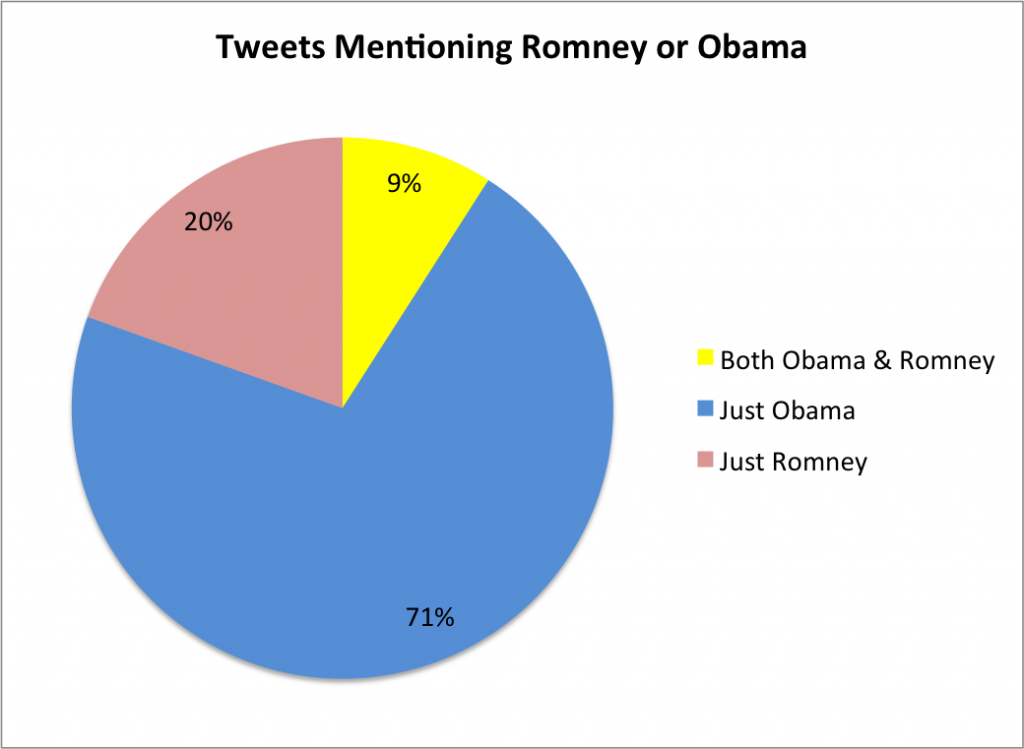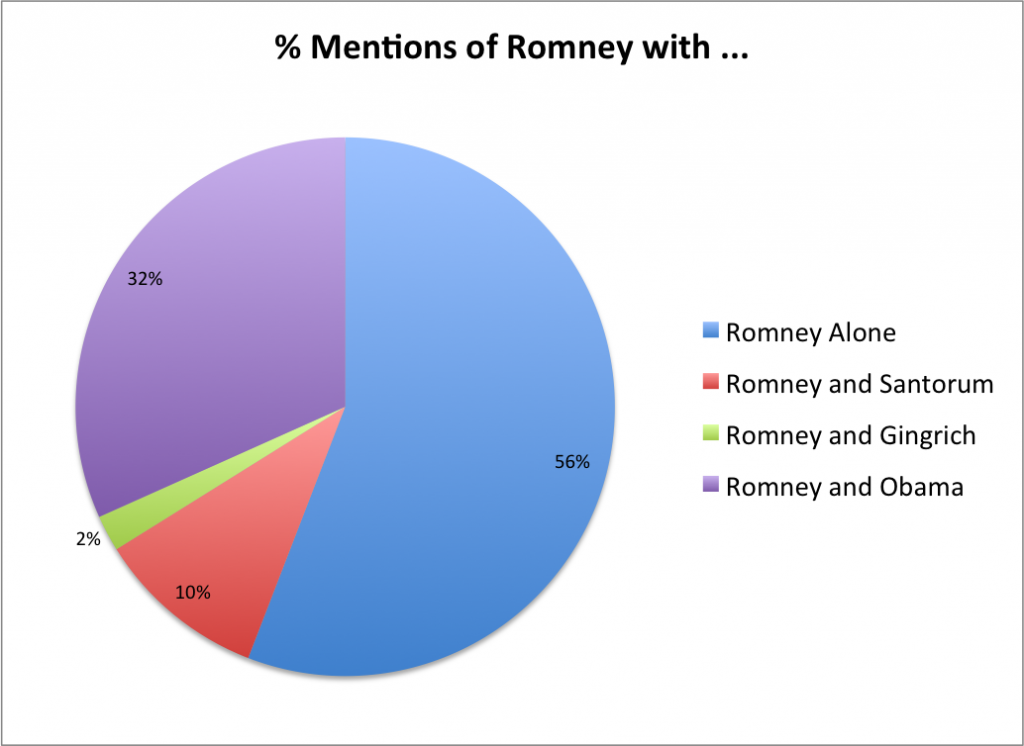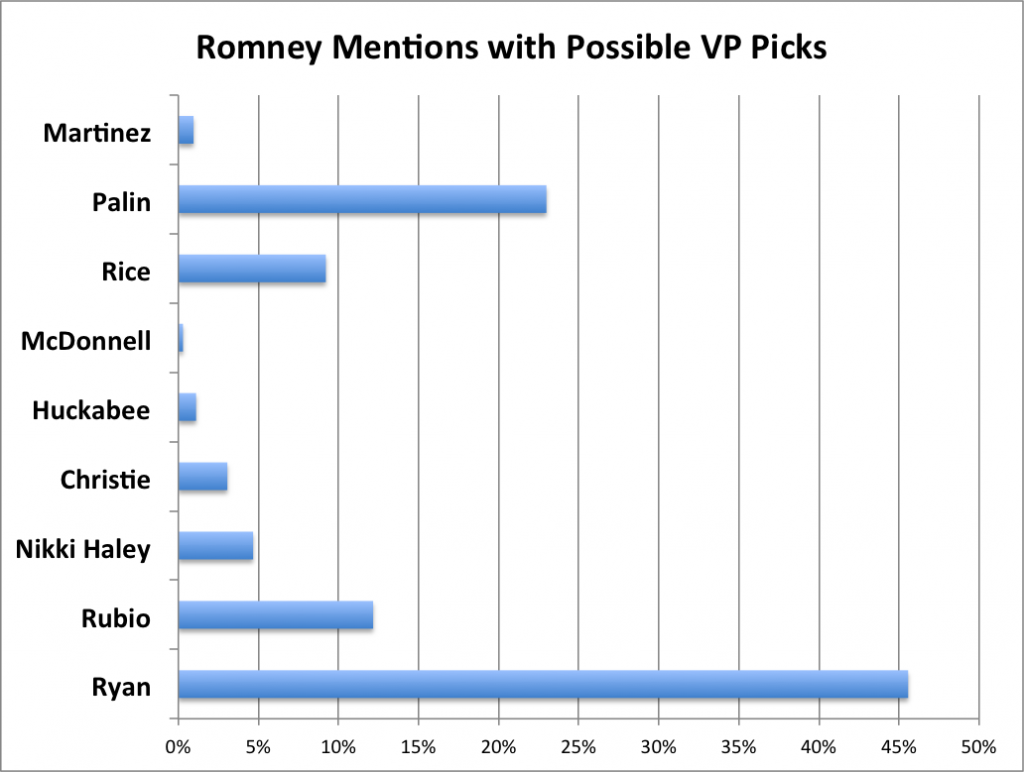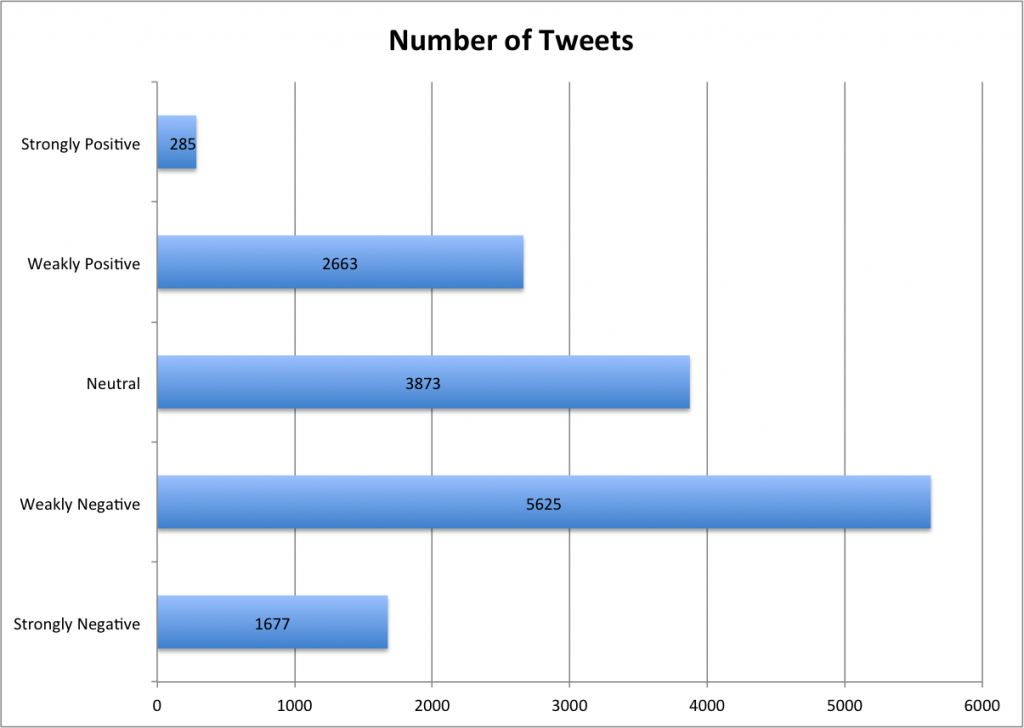With Romney’s wins in the three primaries this week, he has moved from being the favored candidate to the presumptive winner. And, recognizing that, Mitt’s turned his attention to Obama. Santorum who? Newt what?
So has Twitter made the big turn with him? Or is Twitter even paying attention to him yet? I set out to see how Obama and Romney are doing in the Twitterverse. I reviewed nearly 200,000 recent tweets — all of which occurred after the primaries and the anointing of Mitt.
Let’s start with the most interesting — how’s Romney’s presence on Twitter compare to the President’s?

Click to see larger image
Romney’s way behind the President in Twitter mentions by over 3 to 1! Even if half of the Obama mentions are just conservatives complaining about the President, it still means that Obama is the focus of the race, not Romney. That can’t be good.
How does Romney do against his primary competition? After all, since he’s been anointed the winner, mentions of Santorum and Gingrich must be non-existent, right?

Click on chart to enlarge
This one is looking much better for Mitt: his GOP competitors are not being mentioned in the same tweets as he is much any more.
So if attention is moving away from the other GOP contenders, it must be switching to discussion of possible VP picks. Who’s twitter most excited about?

Click on image to enlarge
Looks like Romney and Ryan are all the talk these days! We’ll see how that changes over time as the Wisconsin primary — Paul Ryan’s home state — fades into history.
Let’s look at what hashtags has everyone excited in the Romney and Obama tweets:
Romney
|
Obama
|
| Total Uses |
|
Hashtag |
total |
|
hashtag |
| 2540 |
|
#Romney |
9098 |
|
#tcot |
| 1738 |
|
#tcot |
7032 |
|
#Obama |
| 926 |
|
#GOP |
2551 |
|
#p2 |
| 846 |
|
#newbedon |
2033 |
|
#teaparty |
| 758 |
|
#p2 |
1858 |
|
#gop |
| 616 |
|
#mitt2012 |
1590 |
|
#tlot |
| 476 |
|
#teaparty |
980 |
|
#obama2012 |
| 366 |
|
#Santorum |
955 |
|
#OBAMArevivingSOPA |
| 286 |
|
#news |
921 |
|
#scotus |
| 264 |
|
#tlot |
916 |
|
#news |
| 262 |
|
#WithNewt |
850 |
|
#ocra |
| 248 |
|
#Politics |
769 |
|
#SGP |
| 202 |
|
#ronpaul |
686 |
|
#progress |
| 193 |
|
#gop2012 |
614 |
|
#JOBSAct |
| 182 |
|
#mittromney |
541 |
|
#Politics |
| 174 |
|
#Romney’s |
532 |
|
#Obama’s |
| 166 |
|
#OWS |
531 |
|
#Obamacare |
| 166 |
|
#Mitt |
394 |
|
#USA |
| 162 |
|
#edshow |
381 |
|
#CNN |
| 144 |
|
#250gas |
380 |
|
#vettheprez |
| 125 |
|
#pagop |
355 |
|
#twisters |
| 122 |
|
#waronwomen |
346 |
|
#jobs |
| 113 |
|
#PA |
332 |
|
#OWS |
| 112 |
|
#2012 |
328 |
|
#WorldBank |
| 98 |
|
#maddow |
327 |
|
#NOI |
| 98 |
|
#tiot |
280 |
|
#TPP |
| 88 |
|
#Newt |
278 |
|
#NOBAMA |
| 82 |
|
#LenoMono |
277 |
|
#withNewt |
| 81 |
|
#pennsylvania |
266 |
|
#trayvon |
| 80 |
|
#FAIL |
265 |
|
#newbedon |
It’s interesting to see #tcot at the top of the Obama tags, since that’s Top Conservatives on Twitter. I have to assume that a lot of the tweets just on the topic of Obama are not favorable ones. Or maybe they’re liberals sticking their tongues out at conservatives? That’s a question for another day.
One thing I’m always interested in is what software people are using to post their tweets. Here’s the top 10 clients (and their % of usage) for people who tweeted about Romney and Obama:
| Obama |
Romney |
| 27% |
Web |
21% |
Web |
| 12% |
Tweet Button |
7% |
TweetDeck |
| 9% |
Twitterfeed |
7% |
Twitterfeed |
| 6% |
Twitter for iPhone |
7% |
Tweet Button |
| 5% |
Tweetdeck |
4% |
Twitter for iPhone |
| 3% |
Hootsuite |
3% |
HootSuite |
| 3% |
Twitter for Android |
2% |
dlvr.it |
| 2% |
dlvr.it |
2% |
Twitter for Android |
| 2% |
Twitter for Blackberry |
1% |
Facebook |
| 2% |
Echofon |
1% |
Twitter for Blackberry |
Not a lot of difference. The 3% who are using Hootsuite have more than a casual interest in the topic since they’re using professional grade software. The 5% to 7% who are using TweetDeck are “semi-pro” — you have to be at least a bit serious about Twitter to use it. And I find it interesting that the iPhone gets used twice as often as Android … one thing both democrats and republicans agree upon, it seems, is that the iPhone is better than Android!
It’s interesting to see what words are most associated with Romney and Obama. Here’s the top 30 (minus stop words):
| Words about Romney |
Words about Obama |
| total |
word |
total |
word |
| 31700 |
romney |
120901 |
obama |
| 12498 |
mitt |
23053 |
president |
| 4078 |
romney’s |
13637 |
obama’s |
| 3685 |
santorum |
8717 |
barack |
| 2576 |
will |
7710 |
court |
| 2274 |
pennsylvania |
6845 |
act |
| 1857 |
gop |
6353 |
michelle |
| 1855 |
new |
6180 |
one |
| 1819 |
women |
6090 |
will |
| 1666 |
poll |
5986 |
years |
| 1662 |
video |
5881 |
jobs |
| 1572 |
like |
5670 |
marijuana |
| 1465 |
just |
5641 |
white |
| 1430 |
republican |
5343 |
house |
| 1320 |
says |
5287 |
supreme |
| 1267 |
now |
5284 |
signs |
| 1224 |
paul |
5270 |
use |
| 1215 |
campaign |
5149 |
get |
| 1214 |
one |
5014 |
known |
| 1207 |
win |
4880 |
cocaine |
| 1166 |
can |
4857 |
teen |
| 1050 |
election |
4672 |
like |
| 1029 |
rick |
4455 |
law |
| 1019 |
president |
4335 |
budget |
| 1006 |
get |
4268 |
now |
| 984 |
see |
4060 |
set |
| 975 |
primary |
3972 |
just |
| 962 |
time |
3942 |
women |
| 956 |
take |
3481 |
rules |
| 954 |
vote |
3199 |
today |
It appears that Pennsylvania is still holding out hope for Santorum.
The strong showing of marijuana and cocaine in Obama’s list can be attributed almost single handedly to one tweet that got retweeted 4004 times:
‘RT @WhatTheFFacts: In his teen years, Obama has been known to use marijuana and cocaine.’
And countless other times in mild variations. To be clear, this topic was raised before the last election as well, as “has been known” really means “was mentioned by him in his autobiography written in 1995.” So the excitement the tweet has now is, well, about 17 years too late…
Net net … Romeny needs to excite his followers to talk about him, not Obama, because in November, “Not Obama” will not appear on the ballot!





